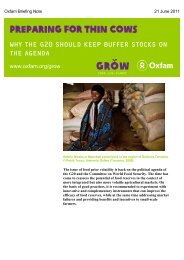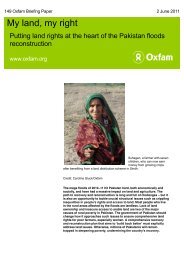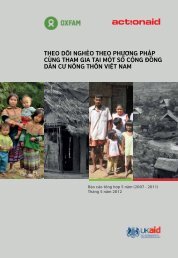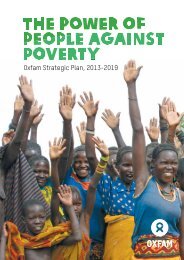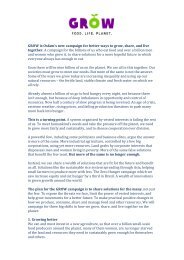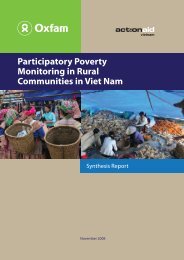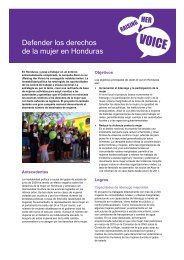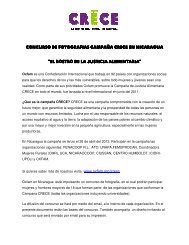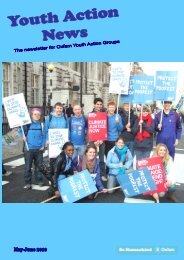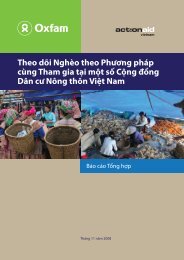The New Forests Company and its Uganda ... - Oxfam Canada
The New Forests Company and its Uganda ... - Oxfam Canada
The New Forests Company and its Uganda ... - Oxfam Canada
You also want an ePaper? Increase the reach of your titles
YUMPU automatically turns print PDFs into web optimized ePapers that Google loves.
<strong>Oxfam</strong> Case Study<strong>The</strong> <strong>New</strong> <strong>Forests</strong> <strong>Company</strong><strong>and</strong> <strong>its</strong> Ug<strong>and</strong>aplantations‘I lost my l<strong>and</strong>. It’s like I’m not ahuman being.’Matt Grainger <strong>and</strong> Kate Geary<strong>Oxfam</strong> International22 September 2011London-based <strong>New</strong> <strong>Forests</strong> <strong>Company</strong> (NFC) would seem to be the designblueprint of how a young modern company should conduct a major l<strong>and</strong>investment in Africa in a responsible way. <strong>Oxfam</strong>’s investigations revealthat serious allegations by people who were evicted from l<strong>and</strong> to makeway for NFC’s operations remain unresolved. How will the companyrespond?EMBARGOED UNTIL 00:01 HRS GMT 22 September 2011(Note: Names changed)
When the <strong>New</strong> <strong>Forests</strong> <strong>Company</strong> (NFC) was formed in 2004 <strong>its</strong> management’s aimwas for it to become East Africa’s biggest forester. <strong>The</strong> UK-registered company hasachieved that, along the way building <strong>its</strong>elf a high-powered <strong>and</strong> influential corporate CV. 1Today, the NFC plants <strong>and</strong> harvests timber on 27,000 hectares of ‘underutilized <strong>and</strong>/ordegraded’ l<strong>and</strong> in Ug<strong>and</strong>a, Tanzania, Mozambique, <strong>and</strong> Rw<strong>and</strong>a; it has deals in thosecountries totalling around 90,000 hectares. 2 <strong>The</strong> plantations contribute jobs <strong>and</strong> revenue,along with the timber products those countries need as they develop <strong>and</strong> which wouldotherwise be logged from natural forests. NFC hopes to attract more revenue fromcarbon cred<strong>its</strong>, obliging the company to submit a full Project Design Document to theUN’s Clean Development Mechanism. 3 In 2008, the Ug<strong>and</strong>a Investment Authority namedNFC an ‘Investor of the Year’. 4 <strong>The</strong> Forest Stewardship Council (FSC) – the global goldst<strong>and</strong>ard for forestry best practice – has certified two of NFC’s Ug<strong>and</strong>an plantations. 5 <strong>The</strong>company has strong political ties in the countries where it works, from central governmentdown to local level. NFC has attracted investment from international banks <strong>and</strong> privateequity funds since 2008. <strong>The</strong> European Investment Bank (EIB), the EU’s financinginstitution, has loaned NFC five million Euros to exp<strong>and</strong> one of <strong>its</strong> Ug<strong>and</strong>an plantations.Agri-Vie Agribusiness Fund, a private equity investment fund focused on food <strong>and</strong>agribusiness in sub-Saharan Africa, has invested $6.7m in NFC. Agri-Vie is <strong>its</strong>elf backedby development finance institutions, notably the World Bank’s private sector lending arm,the International Finance Corporation (IFC). <strong>The</strong> most significant investment in NFCcomes from HSBC (around $10m), which gives HSBC 20 per cent ownership of thecompany <strong>and</strong> one of six seats on the NFC Board. <strong>The</strong>se investors have social <strong>and</strong>environmental st<strong>and</strong>ards to maintain in administering their own portfolios.NFC runs education, health, <strong>and</strong> income-generation programmes with local communities;in Ug<strong>and</strong>a, for example, it has built school rooms, health clinics, wells, <strong>and</strong> latrines, <strong>and</strong>runs literacy programmes <strong>and</strong> tree out-sourcing schemes which are ‘dem<strong>and</strong>-driven’ <strong>and</strong>‘locally-owned’. 6 <strong>The</strong> company says it is now developing a system to quantify the positivesocial impacts that it ‘anecdotally <strong>and</strong> theoretically’ knows are already happening as aresult of <strong>its</strong> investments. 7L<strong>and</strong> has always been a contentious <strong>and</strong> emotive issue, even more so today given fiercecompetition over <strong>its</strong> use <strong>and</strong> spiralling value – <strong>and</strong> particularly so in Africa. NFC appears,on the face of it, to be the design blueprint for how a young modern business can conducta major l<strong>and</strong> investment in Africa in a responsible <strong>and</strong> ethical way. It has economicpower, professional expertise, <strong>and</strong> close political support. It has a h<strong>and</strong>s-on chiefexecutive with local knowledge <strong>and</strong> ethical credentials. 8 <strong>The</strong> company <strong>and</strong> <strong>its</strong> investorshave clear environmental <strong>and</strong> social st<strong>and</strong>ards they commit to uphold <strong>and</strong> has corporatesocial responsibility <strong>and</strong> accountability principles embedded at the heart of <strong>its</strong> operations. 9Given all this, how is it possible that thous<strong>and</strong>s of people in affected communities havealleged that l<strong>and</strong> clearances, which have taken place to make way for NFC’s operationsin Ug<strong>and</strong>a, have been accompanied by distress <strong>and</strong> violence, <strong>and</strong> have left many in astate of poverty?‘Iremember my l<strong>and</strong>, three acres of coffee, many trees – mangoes <strong>and</strong> avocados. I hadfive acres of banana,’ Francis Longoli says. ‘I was given awards as a model farmer. Ihad cows for milk, ten beehives, two beautiful permanent houses. My l<strong>and</strong> gave meeverything from my living to my children’s education. People used to call me Omataka –someone who owns l<strong>and</strong>. Now that is no more. I am one of the poorest now.’ 10Francis is among more than twenty thous<strong>and</strong> people 11 who have been evicted from theirhomes <strong>and</strong> l<strong>and</strong> in Kiboga district, <strong>and</strong> in nearby Mubende district, to make way for NFCplantations.<strong>The</strong> Ug<strong>and</strong>an National Forestry Authority (NFA) granted licences over the plantationareas to NFC in 2005 <strong>and</strong> embarked on procedures to remove the former residents,which it claimed were ‘illegal encroachers’. 12 This had taken place by February 2010 inMubende <strong>and</strong> between 2006 <strong>and</strong> July 2010 in Kiboga. 13 <strong>Oxfam</strong>’s research estimates that2<strong>The</strong> <strong>New</strong> <strong>Forests</strong> <strong>Company</strong> <strong>and</strong> <strong>its</strong> Ug<strong>and</strong>a plantations<strong>Oxfam</strong> Case Study, September 2011
the number of evictees is in the region of 22,500, although that figure could besubstantially higher. 14 NFC, on the other h<strong>and</strong>, claim that this figure is no more than15,191. Even this figure, they say, is likely to be significantly inflated since it is partlybased on a survey conducted by the District Planner from Kiboga, which they claim isunreliable, despite that survey having been paid for by NFC. 15It is alleged in the legal claims lodged by a large number of local villagers against NFCthat individuals whom they believe to be NFC employees took part in evictions. 16 NFCstrongly denies this allegation, stating that the l<strong>and</strong> clearances were voluntary <strong>and</strong> thatthe company played no role in them since ‘it is the sole m<strong>and</strong>ate of the National ForestryAuthority to document, engage with, <strong>and</strong> peacefully vacate any individuals illegallysettling on Central Forest Reserves’. 17 It states that it placed NFC employees on theplantations to observe the eviction process, but states that NFC played no part in theevictions themselves. 18Today, the people evicted from the l<strong>and</strong> are desperate, having been driven into poverty<strong>and</strong> l<strong>and</strong>lessness. In some instances they say they were subjected to violence <strong>and</strong> theirproperty, crops, <strong>and</strong> livestock destroyed. <strong>The</strong>y say they were not properly consulted,have been offered no adequate compensation, <strong>and</strong> have received no alternative l<strong>and</strong>. 19Some of the affected people in Mubende district say that their l<strong>and</strong> had been given tothem in recognition of their fathers or gr<strong>and</strong>fathers having fought in the British army inBurma <strong>and</strong> Egypt during the Second World War. Others say they were in the process ofconverting their title from customary to freehold tenure. Those evicted in Kiboga districtstate that they had been settled on their l<strong>and</strong> for 40 years or more having been invitedthere by the Idi Amin regime. <strong>The</strong>y had functioning village <strong>and</strong> government structures,such as local council systems, schools, health centres, churches, permanent homes, <strong>and</strong>farms on which they grew crops to feed themselves <strong>and</strong> surpluses to sell at market. <strong>The</strong>ypaid taxes. <strong>The</strong>irs were strong <strong>and</strong> thriving permanent communities. 20In 2004, NFC began negotiating with the Ug<strong>and</strong>an Government for a commercial timberdeal. <strong>The</strong> state granted the company a licence to develop three timber plantations – intotal around 20,000 hectares of l<strong>and</strong> – in Mubende, Kiboga, <strong>and</strong> Bugiri districts. <strong>The</strong>company began work in 2005 with a plan to invest $47m over ten years. It has alreadyplanted around 12 million pine <strong>and</strong> eucalyptus trees on 9,300 hectares <strong>and</strong> says itemploys more than 1,400 people.NFC does not own or lease the l<strong>and</strong> in Mubende or Kiboga districts. Its licence comeswith strict conditions, the company says, including not to grow food crops or allow cattlegrazing <strong>and</strong> to ‘strictly defend the boundaries of the reserves’. 21 <strong>The</strong> l<strong>and</strong> is gazetted,which means it is protected as a matter of national importance. In Mubende, the gazettedl<strong>and</strong> that the state licensed to NFC is the Namwasa Forest Reserve (8,958 hectares), <strong>and</strong>in Kiboga, it is the Luwunga Forest Reserve (9,383 hectares). <strong>The</strong>re are also special lawsgoverning forest reserves that make it illegal to grow crops, graze cattle, or erectbuildings. 22NFC states in <strong>its</strong> 2010 Sustainability Report that ‘using the law is not always theappropriate course of action as it is always the poorest who suffer most <strong>and</strong> irrespectiveof the legal position we have a moral obligation, <strong>and</strong> a pragmatic need, to win hearts <strong>and</strong>minds <strong>and</strong> mitigate negative consequences of our investment’. 23 In this case, however,NFC argues ‘no party has proven that the l<strong>and</strong> was de–gazetted <strong>and</strong> thus, theencroachers are illegally occupying l<strong>and</strong> leased to an independent third party, NFC’. 24 Itrelies upon an ‘extensive <strong>and</strong> exhaustive government-driven authentication process’,which it says confirmed that only 31 families on the Namwasa Reserve, <strong>and</strong> none in theLuwunga reserve, had legal rights to remain on the l<strong>and</strong>. 25 It states that it is respecting therights of these families <strong>and</strong> that dealing with ‘illegal’ settlers is the sole m<strong>and</strong>ate of theNFA. 26 NFC regards the thous<strong>and</strong>s of others who were living on the l<strong>and</strong> as ‘illegalencroachers’ who do not have a legitimate claim to compensation. 27<strong>The</strong> <strong>New</strong> <strong>Forests</strong> <strong>Company</strong> <strong>and</strong> <strong>its</strong> Ug<strong>and</strong>a plantations<strong>Oxfam</strong> Case Study, September 20113
In short, the company <strong>and</strong> the officials it dealt with appear to have satisfied themselvesthat most of the people in the Namwasa <strong>and</strong> Luwunga plantations were not allowed onthat l<strong>and</strong> <strong>and</strong> should not have been living there.But people were living there.<strong>Oxfam</strong> research indicates that around 7,400 people were living on the Namwasaplantation <strong>and</strong> at least 15,191 people on the Luwunga plantation. 28NFC <strong>and</strong> government officials have called these people ‘encroachers’ (or ‘illegalencroachers’). <strong>Oxfam</strong> believes this is a dangerously loaded term because it pre-judgespeople’s rights <strong>and</strong> dehumanizes them, making it easier to justify violent tactics. And it isarguably a highly misleading term too, because the people maintain that they did in facthave lawful entitlement to the l<strong>and</strong> <strong>and</strong> were testing that argument in ongoing legal cases.<strong>The</strong>se claims are resisted by NFC <strong>and</strong> neither case has been concluded.In Kiboga, many of the people say they were born on the l<strong>and</strong>, while others say they hadlived there since the early 1970s, building up 40 years’ worth of social <strong>and</strong> communalservices <strong>and</strong> physical infrastructure. Some people say they had bought <strong>and</strong> sold plotsduring that time. In Mubende, the Second World War veterans <strong>and</strong> their descendants saythey were allocated l<strong>and</strong> in recognition of service, while others say they had bought, weregifted, or inherited l<strong>and</strong> in the area since the 1980s. In their legal pleadings, the claimantsassert that they are ‘either bona fide, lawful occupants <strong>and</strong>/or customary tenants <strong>and</strong> areprotected by the constitution of the Republic of Ug<strong>and</strong>a <strong>and</strong> the l<strong>and</strong> laws of Ug<strong>and</strong>a.’ 29NFC states that these proceedings, launched against the company, were misdirectedsince the government, rather than NFC, was responsible for undertaking the evictions. 30 Itsays that the claims ‘have been taken most seriously <strong>and</strong> have been the subject ofextensive legal counsel <strong>and</strong> internal inquiry’, 31 <strong>and</strong> maintains that ‘the cases have failed toappear in court due to the inability of the plaintiffs to assert a legitimate case’. 32 <strong>The</strong>Mubende claims, it says, have ‘been confirmed erroneous by the extensive investigationconducted by the third Prime Minister’s office’. 33 NFC base this on an FSC audit,conducted by SGS, which states that the validity of the claims is ‘highly dubious’ <strong>and</strong> thatthe company acted responsibly to resolve the issue of encroachment. However, <strong>Oxfam</strong>has been told by lawyers representing the community members that the cases are stillactive, <strong>and</strong> this has been acknowledged by NFC. 34 This means that claims brought bythous<strong>and</strong>s of people remain unresolved.In both legal cases, the High Court considered that the communities’ concerns weresufficiently urgent <strong>and</strong> their arguments sufficiently strong 35 to justify granting ordersrestraining evictions until the full case could be heard in court. 36NFC claimed – in <strong>its</strong> 2011 Project Design Document submitted to the CDM – that peoplevacated the l<strong>and</strong> in Mubende ‘voluntarily <strong>and</strong> peacefully’. However, the communities<strong>Oxfam</strong> spoke to describe the evictions as anything but voluntary or peaceful. People told<strong>Oxfam</strong> that the army <strong>and</strong> police were deployed in the area to enforce the evictions <strong>and</strong>that many people were beaten during the process. 37 Some villagers also claim that casuallabourers whom they believe were employed by NFC joined the police <strong>and</strong> army inburning homes, destroying crops, <strong>and</strong> butchering livestock. 38 <strong>The</strong> pleadings in the claimbrought by the Kiboga community allege that NFC ‘purporting to be a licensee of [theNFA], trespassed on the Plaintiffs’ l<strong>and</strong>, destroyed homes, crops, <strong>and</strong> animals of thePlaintiffs <strong>and</strong> attempted to evict the Plaintiffs’. <strong>The</strong>y also allege ‘trespass, uncivility,harassment, <strong>and</strong> abuse’ by NFC <strong>and</strong> <strong>its</strong> agents. <strong>The</strong> Mubende evictees claim thatemployees of NFC were ‘evicting, harassing, erasing their plantations, demolishing theirhouses, intimidating, mistreating’ them. 39 <strong>New</strong>s of the evictions, albeit not referring toNFC as the perpetrator, was published in local media <strong>and</strong> the dispute was described inthe communities’ law su<strong>its</strong> filed in 2009. 40NFC firmly denies involvement in any evictions or violence <strong>and</strong> says ‘there were noincidences of injury, physical violence, or destruction of property during the voluntaryvacation process that have been brought to the attention of NFC’. 41 It continues to rely onthe FSC audit of the Mubende evictions which states that ‘there were no incidences ofinjury to the encroachers or forceful eviction reported during this process’. 42 It also states4<strong>The</strong> <strong>New</strong> <strong>Forests</strong> <strong>Company</strong> <strong>and</strong> <strong>its</strong> Ug<strong>and</strong>a plantations<strong>Oxfam</strong> Case Study, September 2011
that it received no reports of violence from the District Police Commissioner or the NFA,<strong>and</strong> that no such incidents were observed by NFC employees. 43 From materials providedby NFC to <strong>Oxfam</strong>, it does not appear to <strong>Oxfam</strong> to have conducted <strong>its</strong> own detailedinvestigations into any allegations of violence committed during the evictions. It hasconceded some concerns about Askar, the private security company it contracted. In <strong>its</strong>Project Design Document submitted to the Executive Board of the CDM, NFC noted that‘surrounding communities sometimes report that the Askar security guards contracted bythe company extort money from them’ <strong>and</strong> that the guards had ‘generated negativeperceptions of the company.’ In response, NFC recognised a need to commit to ‘training<strong>its</strong> own staff internally <strong>and</strong> will guard against extortion in the future with increasedaccountability <strong>and</strong> auditing’. 44 <strong>The</strong> company says that there were threats to the lives ofNFC staff, which prompted a ‘need for protection during the vacation process’. 45In the course of <strong>its</strong> research, <strong>Oxfam</strong> discovered that in Kiboga – the scene of the firstevictions beginning in 2008 – senior NFC representatives met with local officials on 21August 2008. <strong>The</strong> meeting agreed that NFC would pay seven million shillings ($2,500) toconduct a ‘population survey’ <strong>and</strong>, depending on <strong>its</strong> results, make available at most twosquare miles (1,280 acres) for five years to the ‘historic occupants’ of the l<strong>and</strong>. 46 In theirtestimonies, people described to <strong>Oxfam</strong> that a comprehensive survey did indeed happen.People said they were photographed <strong>and</strong> the value of their l<strong>and</strong> <strong>and</strong> assets recorded.<strong>The</strong>y felt that NFC <strong>and</strong> local officials were making a genuine effort on their behalf.It seems that the process did not result in resettlement or compensation for the evictees.NFC acknowledges that they commissioned <strong>and</strong> paid for a survey, carried out by theKiboga District Planner. Worryingly, they admit that they have not received the finalcensus report, <strong>and</strong> told <strong>Oxfam</strong> that they doubted the findings – believing the figure of over15,000 people to be ‘inflated’. 47 NFC claims it is vital to ‘look behind us to see the imprintour footprints have left behind’, 48 but does not appear to have any data they regard asconclusive about the number of people affected by their operations. IFC PerformanceSt<strong>and</strong>ards, however, require companies to carry out a census with appropriate socioeconomicbaseline data to identify the persons who will be displaced by the project. 49In a letter to <strong>Oxfam</strong>, NFC describes a series of consultations that took place in themonths leading up to the evictions ‘which clearly outlined the conditions under which thevacations should occur, the laws pertaining to l<strong>and</strong> use of central forest reserves, <strong>and</strong> thetimeline to be observed.’ 50 It also claims that the evictions were voluntary. However,<strong>Oxfam</strong>’s research has revealed consistent testimony from evictees of both districts to theeffect that they were not consulted <strong>and</strong> did not consent to losing their l<strong>and</strong>, homes, <strong>and</strong>livelihoods. 51 <strong>The</strong> minutes of the August 2008 meeting between NFC <strong>and</strong> Kiboga districtofficials to discuss resettlement of the evictees show that no community representativeswere present at that meeting. One community leader explained that the proposal waspresented to the community in a public meeting, which was not consultative. <strong>The</strong>proposal was rejected as unacceptable because too little l<strong>and</strong> was offered <strong>and</strong> thesolution was only temporary. 52Lokuda Losil, 60, acquired 30 acres of l<strong>and</strong> in Kiboga in 1973. His eight children wereborn there, so were his six gr<strong>and</strong>children. He grew banana, jackfruit <strong>and</strong> avocado. Hiswas a hard-working but prosperous life. During his interviews with <strong>Oxfam</strong>, Mr Losilprovided eye-witness identification of an NFC staff member who, he says, was directlyinvolved in violence <strong>and</strong> extortion against another evictee when he was forced off hisl<strong>and</strong>.NFC denies any involvement by <strong>its</strong> employees in the evictions <strong>and</strong>, as far as <strong>Oxfam</strong> isaware, no prosecution has been brought against anyone associated with NFC in relationto these events. Other than testimonies given by those affected, <strong>Oxfam</strong> has seen noindependent evidence of involvement by NFC employees; however, Mr Losil’s account isconsistent with others’ testimony presented to <strong>Oxfam</strong>.‘My l<strong>and</strong> was taken by the <strong>New</strong> <strong>Forests</strong> <strong>Company</strong>. People from <strong>New</strong> <strong>Forests</strong> came withother security forces <strong>and</strong> started destroying crops <strong>and</strong> demolishing houses <strong>and</strong> they<strong>The</strong> <strong>New</strong> <strong>Forests</strong> <strong>Company</strong> <strong>and</strong> <strong>its</strong> Ug<strong>and</strong>a plantations<strong>Oxfam</strong> Case Study, September 20115
ordered us to leave,’ he said. ‘<strong>The</strong>y beat people up, especially those who could not run.We ran in a group, my children, my gr<strong>and</strong>children, my wife <strong>and</strong> me. It was such a painfultime because the eviction was so forceful <strong>and</strong> violent.’ 53In his interview with <strong>Oxfam</strong>, Mr Losil provided the name of the NFC Manager that he saidwas involved in the violence: ‘We knew him because he lived near this community <strong>and</strong> hewas someone I recognized as having been involved in the violence.’ He said he hasnever received compensation. ‘<strong>The</strong>re was a survey conducted by <strong>New</strong> <strong>Forests</strong>. Wethought they may be planning to compensate us. But after taking our photos, our names<strong>and</strong> particulars, we have never seen them again,’ he said. ‘I have lost what I owned.Where I am now, my kids cry every day. I cannot sustain them <strong>and</strong> they do not go toschool. Even eating has become a problem.’Mary Nantale has eight children. She told <strong>Oxfam</strong> that she had moved to a village calledKabukokwa in the Luwunga reserve when she was nine years old, in 1976 or 1977. 54‘When they evicted us they told us there was a white man who wanted the l<strong>and</strong>. Weheard it was the <strong>New</strong> <strong>Forests</strong> <strong>Company</strong> that evicted us,’ she said. ‘<strong>The</strong>re were somerallies but no consultations. When they organized rallies they would only say that the l<strong>and</strong>was not ours <strong>and</strong> that we were supposed to leave because it was a forest reserve.’ Shesaid: ‘When they told us to leave, many had nowhere to go, so we resisted. We wereevicted in a violent way. [Armed men] slashed my banana plantation <strong>and</strong> destroyed myhome.’ She says the evictions have left her ‘a hopeless person – I don’t hope for anythinganymore. I’m just surviving. We need compensation. We know we can’t go back but weneed a place to live. We are treated as enemies.’ 55 NFC denies <strong>its</strong> workers were involvedin the evictions, stating that this was not their role <strong>and</strong> that they have received no reportsof violence committed by anyone carrying out the evictions.Gr<strong>and</strong>mother Nabulungi Mangeni, 60, chose to leave the l<strong>and</strong> she had lived on for thepast 37 years. Like many others in the communities <strong>Oxfam</strong> spoke to, Mrs Mangenidescribes rising incidences of violence, forcing families to sleep in the bush.According to testimony <strong>Oxfam</strong> has heard from local villagers, it appears some residentswere told as early as September 2006 that they were to be evicted <strong>and</strong> that evictionsoccurred in waves between 2008 <strong>and</strong> 2010, as the Kiboga project increased in size. On19 June 2009 the Ug<strong>and</strong>a High Court issued an interim order ‘restraining the respondent[i.e. the <strong>New</strong> <strong>Forests</strong> <strong>Company</strong>], <strong>its</strong> workers, agents, assignees ... from evicting theapplicants <strong>and</strong> their families, destroying their crops, schools, hospitals, socialinfrastructure <strong>and</strong> livestock.’ <strong>The</strong> order was to be in force until 2 October 2009 at whichtime the case was to be further heard. However, that hearing did not take place because<strong>Oxfam</strong> underst<strong>and</strong>s the communities were unable to raise their lawyers’ fees. FromMarch to July 2010, thous<strong>and</strong>s more people were evicted from Kiboga.Local communities in Mubende <strong>and</strong> Kiboga say that evictions continued to take placedespite the High Court orders restraining NFC from evicting them. 56 Although NFCacknowledges that voluntary vacations did take place whilst the order was in place, theydeny that they were responsible since they argue that evictions from government l<strong>and</strong> aresolely in the h<strong>and</strong>s of the government <strong>and</strong> <strong>its</strong> designated authorities. 57<strong>The</strong> story of neighbouring Mubende just months later echoes the events of the 2008–2010 Kiboga evictions. In both cases, the local people believed they had legal claimsto the l<strong>and</strong> <strong>and</strong> attempted to get their case heard in court. In both instances, the HighCourt issued an interim order restraining the company from evicting the residents.Promises of compensation, made to community leaders in both Mubende <strong>and</strong> Kiboga,seem to have come to nought. 58 Thous<strong>and</strong>s of people have been left l<strong>and</strong>less, living ah<strong>and</strong>-to-mouth existence, unable to afford to educate their children or to access adequatehealthcare.Many evictees describe feeling dehumanized by the experience. ‘I lost l<strong>and</strong>. I’m l<strong>and</strong>less.L<strong>and</strong> was my life. I have no rights. It’s like I’m not a human being,’ said Fred Bahemuka,a father of eight from Mubende. 596<strong>The</strong> <strong>New</strong> <strong>Forests</strong> <strong>Company</strong> <strong>and</strong> <strong>its</strong> Ug<strong>and</strong>a plantations<strong>Oxfam</strong> Case Study, September 2011
Augustin Allen, 52, is vice-chair of Kyamukasa council. He has nine children agedbetween four <strong>and</strong> 23. ‘My father fought in Egypt for the British during the war,’ he told<strong>Oxfam</strong>. ‘I heard that in Mubende there was l<strong>and</strong> allocated for Second World War veterans<strong>and</strong> their families.’ In 1997, he met the leaders of the veterans. ‘I submitted my dad’sservice papers <strong>and</strong> was allocated 31 acres’. He grew bananas, coffee, beans, <strong>and</strong> maize,selling most of it to traders. He was able to pay for schooling for all of his children. 60Attempts to clear the l<strong>and</strong> of <strong>its</strong> inhabitants began in early 2009 with press reports ofarmed groups beating people in Namwasa forest, 61 leading over 10,000 residents topetition L<strong>and</strong>s Minister, Omara Atubo, in July 2009, to stop the evictions. Mr Atubo said,‘As a ministry in charge of l<strong>and</strong>, we are saddened by what has happened to you. It isimportant to respect your rights irrespective of whether you occupy the l<strong>and</strong> legally or not.<strong>The</strong>re is no need for your colleagues to disappear, your property to be stolen or crops tobe destroyed.’ 62‘<strong>The</strong>re were no consultations before the evictions,’ Mr Allen said. Despite the ongoinglegal claims, on 11 December 2009 three government ministers <strong>and</strong> the Resident DistrictCommissioner visited the area <strong>and</strong> told people to leave by February. Police, backed byarmy troops, were deployed in December. <strong>Oxfam</strong> heard how the police dismantled thelocal primary school – named Bright Future – <strong>and</strong> set fire to the school chairs <strong>and</strong>desks. 63Villagers told <strong>Oxfam</strong> that, in January 2010, the police arrested 18 community leaders.When people met to organize themselves, police broke up the meeting with teargas,according to villagers. ‘<strong>The</strong>y told us we were illegally encroaching,’ Mr Allen said. Duringthe evictions in February, ‘they cut down our crops, burnt <strong>and</strong> demolished our houses,’ MrAllen added.‘We were beaten by soldiers. <strong>The</strong>y beat my husb<strong>and</strong> <strong>and</strong> put him in jail,’ said NaikiApanabang, who claims that her l<strong>and</strong> was given in recognition of her gr<strong>and</strong>father havingfought in the British army in Burma in the Second World War. ‘<strong>The</strong> eviction was veryviolent. <strong>The</strong> people behind it were the Resident District Commissioner, the police, casuallabourers of the <strong>New</strong> <strong>Forests</strong> <strong>Company</strong>, the army, <strong>and</strong> a private security company calledAskar.’Ms Apanabang has eight children. She now lives in a rented house for 15,000 shillings($5.50) a month <strong>and</strong> says even finding this money is now a problem. She earns somemoney from casual work when she can find it. She cannot afford school fees. Beforebeing evicted, she said her family ate well from a variety of crops they grew. ‘Now we relyon posho [a maize porridge staple] <strong>and</strong> the days I fail to get posho, we sleep on emptystomachs,’ she said. ‘One of the things that most touches my life now is that I haveforgotten the feeling of eating well.’‘I remember I wrote the details in my notebook,’ she said. ‘<strong>The</strong> officials gave us adeadline to leave between the 12 th <strong>and</strong> 28 th of February 2010. I chose to leave on the12th. We saw them burning down people’s houses <strong>and</strong> cutting down people’s plantations.That convinced me to collect my children <strong>and</strong> leave. It was too painful. And what I fearedis what has happened – we have nothing to eat. My children are not going to school <strong>and</strong>we don’t know what the future holds.’Mr Allen says: ‘One of the things that pained me most was that my l<strong>and</strong> was the source ofincome for school fees for my children. I am not an educated person. It was my plan toraise money to educate my children so that when I’m gone they can take care of otherfamily members. But now I can only afford to send one of my six children to school. Nowthey are held back, they are nobody. That is the painful thing.’‘We are no longer interested in going back to the l<strong>and</strong> we had before. We only want tohave money to buy some new l<strong>and</strong> somewhere else. Let the past settle,’ Mr Allen said. ‘Ionly pray to God that a miracle comes now, to get l<strong>and</strong> somewhere else. I think that iswhen we shall have back the peace <strong>and</strong> happiness in the family that we have all lost.’Maria Peimong is a 66-year old gr<strong>and</strong>mother who was evicted from Kyato village inMubende, where she told <strong>Oxfam</strong> she had lived for over 15 years. She used to farm<strong>The</strong> <strong>New</strong> <strong>Forests</strong> <strong>Company</strong> <strong>and</strong> <strong>its</strong> Ug<strong>and</strong>a plantations<strong>Oxfam</strong> Case Study, September 20117
maize, bananas, avocado, <strong>and</strong> jackfruit; she had eight cows <strong>and</strong> 15 goats. Now she isreduced to a precarious existence: ‘I am an old woman. Now I just work as a casuallabourer in this village where I found refuge. At my age how can I live like that? ... It is sofrightening.’ She is terrified of falling sick as ‘that means going for a day without a meal,because you cannot work.’ 64Avery different story is told by the company sent to audit NFC for the FSC certificationof <strong>its</strong> Namwasa plantation in Mubende.<strong>The</strong> auditors noted the ongoing l<strong>and</strong> dispute when they visited the area in February 2010:‘in excess of 540 households (mostly from Rw<strong>and</strong>a) have recently illegally settled onNamwasa FMU. <strong>The</strong>y have erected a large number of structures <strong>and</strong> started cultivatingagricultural fields.’ According to the auditors, the government had made repeatedattempts to persuade the people to leave. To facilitate this process, they said, thecompany offered to pay compensation, but the government declined this as it would set‘an unacceptable national precedent.’ 65When the auditors returned later that year to check on progress, they were reassuredthat, ‘Encroachers were allowed to harvest their annual crops <strong>and</strong> remove their structures<strong>and</strong> other portable properties. By 1 March 2010, the company surveyed the l<strong>and</strong> <strong>and</strong>found that all illegal settlers on the plantation had voluntarily vacated the reserve... <strong>The</strong>rewere no incidences of injury to the encroachers or forceful eviction reported during thisprocess.’ 66<strong>The</strong> FSC certifies forestry investments that adhere to best operating practices regardinglabour, social, <strong>and</strong> environmental issues. While the FSC’s Principles <strong>and</strong> Criteria requirethe protection of local rights of ownership, use, or access, the certification of operationssometimes falls short of this requirement. <strong>Oxfam</strong> believes this is the case for the FSCcertification of NFC’s plantation in Mubende, as the nature of the evictions appears toconstitute a disregard for these rights. For instance, FSC Principle 2 on tenure <strong>and</strong> userights <strong>and</strong> responsibilities requires that ‘appropriate mechanisms shall be employed toresolve disputes over tenure claims <strong>and</strong> use rights’ <strong>and</strong> that ‘disputes of substantialmagnitude involving a significant number of interests will normally disqualify an operationfrom being certified.’ Principle 4, on community relations <strong>and</strong> worker’s rights, requiresappropriate mechanisms ‘for providing fair compensation in the case of loss or damageaffecting the legal or customary rights, property, resources, or livelihoods of localpeoples.’ NFC cited, in a letter to <strong>Oxfam</strong>, a surveillance audit report conducted by theFSC in June 2010, which concluded that ‘the company has followed peaceful means <strong>and</strong>acted responsibly to resolve the issue of encroachment <strong>and</strong> currently there are no tenure<strong>and</strong>/or use right disputes of substantial magnitude to affect the activities of thecompany.’ 67 However, in light of the pending court cases, involving significant numbers ofclaimants, as well as the communities’ reports that no compensation was provided forlosses of property <strong>and</strong> livelihoods, <strong>Oxfam</strong> does not see how FSC Principles 2 <strong>and</strong> 4 canhave been adhered to. 68<strong>The</strong> IFC has Performance St<strong>and</strong>ards relating to the rights of local people facing‘involuntary resettlement’ similar to those of the FSC. <strong>The</strong> IFC reviewed NFC’s Namwasaoperation as part of the due diligence for <strong>its</strong> $7m equity investment in Agri-Vie, a privateequity agribusiness fund whose portfolio includes NFC. On the one h<strong>and</strong>, the IFCconcluded that NFC had been unable to comprehensively apply the principles guidingresettlement in IFC’s Performance St<strong>and</strong>ard on l<strong>and</strong> acquisition <strong>and</strong> involuntaryresettlement. This st<strong>and</strong>ard recognises that project-related l<strong>and</strong> acquisition <strong>and</strong>restrictions on l<strong>and</strong> use can have an adverse impact on communities using the l<strong>and</strong> <strong>and</strong>therefore requires that affected communities are provided with compensation,resettlement, <strong>and</strong> livelihood restoration. 69 Yet, because this was a case of governmentledsettlement <strong>and</strong> because NFC had demonstrated, in IFC’s view, ‘all possible efforts toengage <strong>and</strong> collaborate with the Government agency,’ the IFC was satisfied that NFCdemonstrated compliance with the st<strong>and</strong>ard ‘to the extent allowed by the Government.’ 70<strong>The</strong> IFC assessment does not cover NFC’s Kiboga operations.8<strong>The</strong> <strong>New</strong> <strong>Forests</strong> <strong>Company</strong> <strong>and</strong> <strong>its</strong> Ug<strong>and</strong>a plantations<strong>Oxfam</strong> Case Study, September 2011
<strong>The</strong> EIB also has Environmental <strong>and</strong> Social Principles <strong>and</strong> St<strong>and</strong>ards for the projects thatit finances. <strong>The</strong> EIB funded the expansion of NFC’s Namwasa operation through a €5mloan, together with a €650,000 subsidy grant to finance the company’s Corporate SocialResponsibility (CSR) work. Like the IFC, the EIB also supports NFC indirectly via a $12minvestment in Agri-Vie. <strong>The</strong> EIB says it was aware of l<strong>and</strong> disputes between communities<strong>and</strong> the NFC <strong>and</strong> the risk this posed to the project. It says that, irrespective of theoutcome of the ongoing legal procedures, it is satisfied by the project’s EnvironmentalImpact Assessment, <strong>and</strong> that it believes NFC to have acted within <strong>its</strong> rights. <strong>The</strong> EIB saysit considers the project to be fully in line with <strong>its</strong> Environmental <strong>and</strong> Social Principles <strong>and</strong>St<strong>and</strong>ards. <strong>The</strong>se include a st<strong>and</strong>ard on involuntary resettlement that requires that‘people whose livelihoods are negatively affected by a project should have theirlivelihoods improved or at minimum restored <strong>and</strong>/or adequately compensated for anylosses incurred.’ 71 Again the EIB does not appear to have assessed the social impacts ofNFC’s Kiboga operations.HSBC bank has invested around $10m in NFC, has 20 per cent ownership in thecompany, <strong>and</strong> also has a seat on the NFC board. It made <strong>its</strong> investment in NFCconditional upon the company making adequate progress towards certification from theFSC. 72 HSBC also has a number of sustainability policies for ‘sensitive sectors’, includinga Forest L<strong>and</strong> <strong>and</strong> Forest Products Sector Policy, <strong>and</strong> says that NFC meets the Bank’ssustainability requirements for this the sector. 73 However, HSBC’s policies (<strong>and</strong> those ofother investors) rely heavily on assurances provided by the independent confirmation ofexternal bodies, like FSC, <strong>and</strong> in <strong>Oxfam</strong>’s view this case highlights serious failures inthose processes of independent assessment<strong>The</strong> NFC denies any role in evicting local communities in Mubende <strong>and</strong> Kiboga, claimingthat the government would be responsible for any evictions. <strong>The</strong> company says,‘Evictions from government l<strong>and</strong> – which go on in Ug<strong>and</strong>a every day – are solely in theh<strong>and</strong>s of the government <strong>and</strong> <strong>its</strong> designated authorities such as the Ug<strong>and</strong>a WildlifeAuthority, the National Forestry Authority, <strong>and</strong> the Ministry of L<strong>and</strong>s. We are expresslyprohibited from dialogue <strong>and</strong> interaction from any illegal encroachers.’ 74Equally, the company says, ‘as licensees we are expressly prohibited from offeringanyone on government l<strong>and</strong> any compensation.’ 75<strong>The</strong> Ug<strong>and</strong>an government, at local <strong>and</strong> national levels, appears to have played a centralrole in the evictions in Mubende <strong>and</strong> Kiboga. International rights st<strong>and</strong>ards are clear thatgovernments are the primary duty bearers for the respect, protection, <strong>and</strong> promotion ofthe rights of their citizens. 76Until the mid-2000s, authorities had seemed to tolerate or even endorse localcommunities’ rights to the l<strong>and</strong> in some instances. For example, in Mubende,descendants of war veterans were offered l<strong>and</strong> with approval of the local governmentauthority, 77 <strong>and</strong> people’s applications to convert from customary to freehold or leaseholdtitle, or to register public l<strong>and</strong> for agricultural purchases, were being processed byauthorities. In Kiboga, local councils <strong>and</strong> administrative structures representing theevictees were recognised by the government. 78 <strong>The</strong> Minister of General Duties, wrote in2004 of 20,000 people in Luwunga Forest, ‘these people have stayed in this place sincethe early 1970s.’ 79 This attitude began to shift, however, particularly with the creation ofthe National Forestry Authority (NFA) in 2003, according to Ug<strong>and</strong>an NGO ACODE,which studied the role of the NFA towards ‘encroachers’. 80In November 2009, the Minister for Internal Affairs, the Minister for Water <strong>and</strong>Environment, the Minister for L<strong>and</strong>s, <strong>and</strong> the Resident District Commissioner attended ameeting in Mubende district, which gave people till 28 February to leave their l<strong>and</strong>. 81Evictees from Kiboga told <strong>Oxfam</strong> that government officials, including former StateMinister for Defence <strong>and</strong> district officials, accompanied by police <strong>and</strong> army, held ameeting to dem<strong>and</strong> that people leave their homes by March 2010. 82 Not all governmentrepresentatives backed the evictions, however. <strong>The</strong> L<strong>and</strong>s Minister said of the Mubendeevictions, ‘<strong>The</strong>se acts against our citizens should stop immediately. Investment is onlygood if the residents benefit from it. Human beings are more important than trees.’ 83 In<strong>The</strong> <strong>New</strong> <strong>Forests</strong> <strong>Company</strong> <strong>and</strong> <strong>its</strong> Ug<strong>and</strong>a plantations<strong>Oxfam</strong> Case Study, September 20119
2008, the District Chair of Kiboga called, in a letter to the Prime Minister, for a halt to the‘brutal <strong>and</strong> forceful evictions’ arguing, ‘whereas the above forests were gazetted long agono effort was made by the governments of those days from preventing people fromencroaching upon them, as a result people began settling in these reserves as early as1971, we have to agree that this period is long enough to allow some to make a numberof developments on this l<strong>and</strong>.’ 84It also appears that the authorities failed to assist evictees with compensation oralternative l<strong>and</strong>. Some in government believed the state had an obligation tocompensate those it evicted; for example, a letter from the Office of the Prime Ministerabout the Kiboga evictions to the Minister of General Duties states, ‘Unfortunately up tonow neither resettlement nor compensation has been made. <strong>The</strong> Prime Minister hasdirected me to request you to convene an inter-Ministerial meeting involving the Minister<strong>and</strong> Minister of State for L<strong>and</strong>s <strong>and</strong> Urban Development with their PermanentSecretaries to resolve the matter within one month.’ 85 However, none of the evicteesinterviewed by <strong>Oxfam</strong> had received compensation or resettlement. <strong>The</strong> InternationalCovenant on Economic <strong>and</strong> Social Rights, to which the Ug<strong>and</strong>an government is asignatory, prohib<strong>its</strong> government actions that result in degradation of citizens’livelihoods. 86 NFC argues that the government prevented it from offering compensationto evictees. 87National governments have a duty to protect their citizens’ rights. However, under theinternational st<strong>and</strong>ards to which it says it adheres, NFC also has clear obligations toconsult <strong>and</strong> negotiate with affected communities <strong>and</strong> to ensure those who are evicted asa result of <strong>its</strong> operations are not materially worse off than before through compensationfor lost assets, provision of alternative l<strong>and</strong>, <strong>and</strong> restoration of livelihoods. NFC says,‘Our main challenge remains encroachment on National Forest Reserves – this hasinhibited our planting programmes in the past <strong>and</strong> prevents us seeking out more CFRson which to plant.’ 88 <strong>The</strong> Acting Director of the NFA told <strong>Oxfam</strong>, ‘We need to make sureinvestor l<strong>and</strong> is secure.’ 89 NFC states that it is subject to the safeguards of the IFC – anindirect investor in NFC. <strong>The</strong> IFC is clear that if government-managed resettlement <strong>and</strong>compensation of affected communities does not live up to <strong>its</strong> st<strong>and</strong>ards, then thecompany must collaborate with the government to ‘achieve outcomes that are consistentwith the Performance St<strong>and</strong>ard.’ 90 Similarly, the FSC, whose st<strong>and</strong>ards NFC comm<strong>its</strong> touphold in <strong>its</strong> Environmental Policy, states, ‘Special attention will be paid to social issuesof l<strong>and</strong> acquisition for plantations, especially the protection of local rights of ownership,use, or access.’ 91 NFC has pointed to <strong>its</strong> community development programmes, statingthat ‘former encroachers who were from Mubende or Kiboga originally, settle outside theboundaries of the reserve <strong>and</strong> thus benefit from both plantation jobs which areadvertised in surrounding communities <strong>and</strong> the various educational, health, <strong>and</strong>livelihood enhancing projects implemented by NFC, communities, <strong>and</strong> localgovernment’. 92 However, it acknowledges that it is unable to confirm whether theaffected communities have access to these projects, since it ‘has been difficult to followthe former encroachers once they vacate the reserve’ 93 <strong>and</strong> that it did not have theresources to do so. 94 An assessment of NFC’s Mubende plantation by the IFC foundthat the company had discharged <strong>its</strong> obligations by acting ‘in accordance with lawsprohibiting their direct compensation of encroachers while still applying pressure onDistrict <strong>and</strong> National government.’<strong>Oxfam</strong> believes that the affected communities in Kiboga <strong>and</strong> Mubende deserve tohave their case heard <strong>and</strong> to see justice done.<strong>Oxfam</strong> defines ‘l<strong>and</strong> grabs’ as l<strong>and</strong> acquisitions that violate human rights <strong>and</strong> do not allowfor the free, prior, <strong>and</strong> informed consent of the affected l<strong>and</strong> users. In the case of NFC, itdoes not matter that the company has not bought or leased the l<strong>and</strong>, but merely licensedit from the government: the effective result is that it has influence over what happens onthat l<strong>and</strong> for 50 years. <strong>The</strong> company <strong>and</strong> government argue that those who lived on thel<strong>and</strong> were there ‘illegally’; however, under any st<strong>and</strong>ards of good practice – be they thoseof the FSC, the World Bank, or private investor policies, such as those of HSBC – forced10<strong>The</strong> <strong>New</strong> <strong>Forests</strong> <strong>Company</strong> <strong>and</strong> <strong>its</strong> Ug<strong>and</strong>a plantations<strong>Oxfam</strong> Case Study, September 2011
eviction without prior consultation on this scale <strong>and</strong> of this nature is not <strong>and</strong> can never beacceptable, nor is the lack of any compensation for the destroyed homes, farms, <strong>and</strong>livelihoods of affected communities. <strong>The</strong>se international st<strong>and</strong>ards exist to affordprotection to vulnerable communities in cases where national regulations may not besufficient or have not been effectively implemented. In this case it appears that thoseinternational st<strong>and</strong>ards have not been adequately implemented to safeguard the affectedcommunities from the devastating impacts of the evictions.In <strong>Oxfam</strong>’s view, NFC <strong>and</strong> <strong>its</strong> financial backers must be held to account for the lostlivelihoods <strong>and</strong> shattered lives of families evicted from the l<strong>and</strong> they farmed. <strong>Oxfam</strong> iscalling on NFC <strong>and</strong> <strong>its</strong> investors to:Hold a full investigation into the events in Kiboga <strong>and</strong> Mubende, <strong>and</strong> make theterms of reference for the investigation <strong>and</strong> <strong>its</strong> findings, public;Commit to a transparent <strong>and</strong> accountable process to provide justice for theaffected communities <strong>and</strong>, in consultation with affected communities <strong>and</strong> local<strong>and</strong> national authorities, ensure the provision of alternative l<strong>and</strong> <strong>and</strong>compensation for lost homes, crops, livestock, <strong>and</strong> livelihoods;Provide damages for any abuses found to have been suffered by affectedcommunities;Where failures are found, commit to reform their policies, st<strong>and</strong>ards, <strong>and</strong>procedures, so that such abuses can never happen again.<strong>The</strong> <strong>New</strong> <strong>Forests</strong> <strong>Company</strong> <strong>and</strong> <strong>its</strong> Ug<strong>and</strong>a plantations<strong>Oxfam</strong> Case Study, September 201111
NOTES1 http://www.newforests.net/index.php/hmd_article/new-forests-signs-major-forestconcession-agreement-with-the-government-of-rw<strong>and</strong>a(Accessed 21 August 2011)2 http://www.newforests.net/index.php/hmd_article/new-forests-signs-major-forestconcession-agreement-with-the-government-of-rw<strong>and</strong>a(Accessed 21 August 2011)3 UNFCCC/CNNUCC Project Design document for afforestation <strong>and</strong> reforestationproject activities: <strong>The</strong> Namwasa Forestation Project; 2011http://cdm.unfccc.int/UserManagement/FileStorage/SDRN4ZBQ7XGTGK2W2TH9Y83L11ANG7 (Accessed 21 August 2011)4 ‘Ug<strong>and</strong>a President Museveni gives the <strong>New</strong> <strong>Forests</strong> <strong>Company</strong> ‘Investor of the Year’award’, 18 January 2008, www.forests.com/news (Accessed 21 August 2011)5 http://www.forestry.sgs.com/forest-management-reports-ug<strong>and</strong>a.htm (Accessed 21August 2011)6 NFC Sustainability Report FY10: July 2009 – June 2010, p.52: ‘all projects must bedem<strong>and</strong> driven (inspired <strong>and</strong> owned by local communities), involve local <strong>and</strong> nationalpartnerships...’7 http://www.newforests.net/index.php/responsibility/social-return-on-investment8 NFC is closely identified with <strong>its</strong> Chief Executive Officer, founder, <strong>and</strong> majorshareholder, who has vast local knowledge, having been raised in southern Africa <strong>and</strong>having worked as African Bureau Chief for the Financial Times. He is actively involved inhuman rights work <strong>and</strong> has been central in the company developing a strong corporatesocial responsibility profile.9 NFC comm<strong>its</strong> in <strong>its</strong> Environmental Policy to meet the requirements of the principles <strong>and</strong>criteria of the FSC, which has clear guidelines on how communities affected bycompanies’ operations should be consulted <strong>and</strong> compensated <strong>and</strong> how l<strong>and</strong> acquisitionsshould be managed.10 Interview conducted by <strong>Oxfam</strong> investigation team in Kiboga, 29 July 2011.11 <strong>The</strong> legal case filed by the Mubende evictees is brought on behalf of 1,489 families,which, based on an average family size of five (Ug<strong>and</strong>a Demographic <strong>and</strong> Health Survey2006), equates to approximately 7,400 people. In relation to Kiboga, a letter from theOffice of the Prime Minister to the Minister for Water, L<strong>and</strong>s, <strong>and</strong> Environment, datedNovember 2004, refers to 20,000 people under threat of eviction in Kiboga district, who‘have stayed in this place since the early 1970s’. <strong>Oxfam</strong>’s interviews with the lawyers forthe communities <strong>and</strong> with the communities themselves suggest that the figures could besignificantly higher. NFC bases <strong>its</strong> enumeration of evictees in Mubende on a governmentprocess in which 540 families submitted claims for compensation (applying an averagefamily size of five, this gives 2,700 individuals). In Kiboga, it says a census identified15,191 affected individuals in Kiboga (although the company suggests that this mayoverestimate the actual figure). In a call with <strong>Oxfam</strong> on 14 September 2011, NFCestimated the number concerned to be around 17,800 (subject to <strong>its</strong> concerns regardingthe accuracy of the Kiboga census).12 Based on meetings between <strong>Oxfam</strong> <strong>and</strong> the Acting Executive Director <strong>and</strong> the DeputyDirector of the NFA. IFC ‘Back to office report on <strong>The</strong> <strong>New</strong> <strong>Forests</strong> <strong>Company</strong> (Ug<strong>and</strong>a)following <strong>and</strong> IFC Mission’, dated 16–19 March 2010, provided to <strong>Oxfam</strong> by NFC, refersto NFA statements on ‘encroachers’ on the l<strong>and</strong>.12<strong>The</strong> <strong>New</strong> <strong>Forests</strong> <strong>Company</strong> <strong>and</strong> <strong>its</strong> Ug<strong>and</strong>a plantations<strong>Oxfam</strong> Case Study, September 2011
13 NFC claim that a ‘voluntary vacation process at Luwunga took place betweenNovember 2008 <strong>and</strong> July 2010’, written feedback to <strong>Oxfam</strong>, dated 15 September 2011.14 Ibid, 1115 Written feedback from NFC to <strong>Oxfam</strong>, dated 15 September 2011.16 <strong>The</strong> pleadings in the claim brought by the Kiboga community allege that NFC‘purporting to be a licensee of [the NFA], trespassed on the Plaintiffs’ l<strong>and</strong>, destroyedhomes, crops <strong>and</strong> animals of the Plaintiffs <strong>and</strong> attempted to evict the Plaintiffs’. <strong>The</strong>y alsoallege ‘trespass, uncivility, harassment <strong>and</strong> abuse’ by NFC <strong>and</strong> <strong>its</strong> agents. (Amendedplaint in Civil Suit No. 102 of 6 July 2009. Eliphaz Rutaryabusha, Kahinda Uzieri v <strong>The</strong><strong>New</strong> Forest <strong>Company</strong> Ltd (NFC), <strong>The</strong> National Forestry Authority, <strong>The</strong> AttorneyGeneral, Pierre Le Raux <strong>and</strong> Julian Ozanne t/a <strong>The</strong> <strong>New</strong> <strong>Forests</strong> <strong>Company</strong>, KibogaDistrict Local Government.) <strong>The</strong> Mubende evictees claim that employees of NFC were‘evicting, harassing, erasing their plantations, demolishing their houses, intimidating,mistreating’ them. Plaint filed by 1,489 claimants in Civil Suit No. 164 of 2009 (High Courtof Ug<strong>and</strong>a Holden at Nakawa).17 Letter from NFC to <strong>Oxfam</strong>, dated 9 September 2011.18 Written feedback to <strong>Oxfam</strong>, dated 15 September 2011.19 During meetings <strong>and</strong> interviews with the communities, villagers told <strong>Oxfam</strong> that noneof them, <strong>and</strong> no-one they knew who had lost their homes <strong>and</strong> livelihoods, had receivedcompensation or alternative l<strong>and</strong> to date. Some say that local authorities offeredcompensation, but this has come to nought. <strong>Oxfam</strong> heard that, in Kiboga, a proposal wasmade to offer alternative l<strong>and</strong>, for a period of five years. <strong>The</strong> communities say theyrejected this offer because it provided insufficient space <strong>and</strong> was merely a temporarysolution. NFC accepts that the failure to provide compensation ‘is of great concern toNFC for both risk mitigation <strong>and</strong> ethical reasons’, <strong>and</strong> says that it pressured thegovernment to compensate eligible evictees with the ‘value of their crops <strong>and</strong> lost l<strong>and</strong> oralternative’.In <strong>its</strong> Sustainability Report for FY2009–2010, NFC says ‘the easiest <strong>and</strong> cheapest route forus would have been to have paid compensation but Government, our l<strong>and</strong>lord, ruled thisout as setting a dangerous precedent for community conflicts on hundreds of other tractsof government l<strong>and</strong>.’ NFC told <strong>Oxfam</strong> ‘we are firmly in support of compensation <strong>and</strong>believe this not only fair <strong>and</strong> just but also the fastest way to a mutually beneficialsolution. However, as licensees we are expressly prohibited from offering anyone ongovernment l<strong>and</strong> any compensation.’ NFC says that an audit of <strong>its</strong> Mubende plantationby the IFC found that the company had discharged <strong>its</strong> obligations by acting ‘inaccordance with laws prohibiting their direct compensation of encroachers while stillapplying pressure on District <strong>and</strong> National government’.20 Based on allegations <strong>and</strong> documents produced at three meetings in Mubende district<strong>and</strong> four meetings in Kiboga disctrict, attended by over 600 people, in July 2011.21 Email from Julian Ozanne, CEO of NFC, to <strong>Oxfam</strong>, dated 15 August 2011.22 Section 33 of the National Forestry <strong>and</strong> Tree Planting Act 2003.23 NFC Sustainability Report FY10: July 2009 – June 2010.24 Letter from NFC to <strong>Oxfam</strong>, dated 9 September 2011.25 Written feedback from NFC to <strong>Oxfam</strong> dated 15 September 2011. Plaintiffs claim rightsto the l<strong>and</strong> in the legal cases referred to above <strong>and</strong> these claims have not yet beendetermined by the courts. <strong>Oxfam</strong> has copies of the pleadings filed by the claimants from<strong>The</strong> <strong>New</strong> <strong>Forests</strong> <strong>Company</strong> <strong>and</strong> <strong>its</strong> Ug<strong>and</strong>a plantations<strong>Oxfam</strong> Case Study, September 201113
Mubende, as well as documents demonstrating allocation of l<strong>and</strong> to war veterans, <strong>and</strong>has interviewed the lawyers representing the Mubende evictees. <strong>The</strong>se arguments werealso reflected in focus group discussions <strong>and</strong> individual interviews with evicteesconducted by <strong>Oxfam</strong> <strong>and</strong> <strong>its</strong> partner organisations in July 2011.26 Letter from NFC to <strong>Oxfam</strong>, dated 9 September 201127 Letter from NFC to <strong>Oxfam</strong>, dated 9 September 2011; <strong>and</strong> written feedback from NFC to<strong>Oxfam</strong>, dated 15 September 2011.28 Ibid, 1129 <strong>Oxfam</strong> has copies of the pleadings filed by the claimants from Mubende, as well asdocuments demonstrating allocation of l<strong>and</strong> to war veterans, <strong>and</strong> has interviewed thelawyers representing the Mubende evictees. <strong>The</strong>se arguments were also reflected in focusgroup discussions <strong>and</strong> individual interviews with evictees conducted by <strong>Oxfam</strong> <strong>and</strong> <strong>its</strong>partner organisations in July 2011.30 Email from CEO of NFC to <strong>Oxfam</strong>, dated 5 September 2011; written feedback fromNFC to <strong>Oxfam</strong>, dated 15 September 2011.31 Written feedback from NFC to <strong>Oxfam</strong>, dated 15 September 2011.32 Letter from NFC to <strong>Oxfam</strong>, dated 9 September 2011.33 Written feedback from NFC to <strong>Oxfam</strong>, dated 15 September 2011.34 <strong>Oxfam</strong> has interviewed the lawyers representing evictees; telephoneconversationbetween NFC <strong>and</strong> <strong>Oxfam</strong> on14 September 2011.35 <strong>Oxfam</strong> has received the following advice from Ug<strong>and</strong>an lawyers: the requirements forgranting an interim order are that the matter is urgent in terms of impending danger <strong>and</strong>that an application for an injunction has been filed <strong>and</strong> is pending hearing. Anapplication for an injunction looks at three tests: whether there is a serious question to betried; imminent danger; <strong>and</strong> the impossibility of atoning in damages in the event theinjunctive relief is not granted. <strong>The</strong> court is guided in <strong>its</strong> deliberations by a ‘balance ofconvenience’ test. <strong>The</strong> requirements for an applicant are quite high, but are premised onthe need to maintain the status quo until a court can hear <strong>and</strong> determine the mainapplication. Both, being discretionary remedies, will be granted or denied depending onthe particular circumstances <strong>and</strong> the force of the arguments made.36 <strong>Oxfam</strong> has a copy of the Interim Order granted by the Central High Court of Nakawaon 19 June 2009 against NFC, ‘restraining the respondent, <strong>its</strong> workers, agents, assignees<strong>and</strong>/or those acting through or delivering authority from it, from evicting the applicants<strong>and</strong> their families, destroying their crops, schools, hospitals, social infrastructure <strong>and</strong>livestock’. <strong>The</strong> Kiboga order remained in force until 2 October 2009. In Mubende, <strong>Oxfam</strong>underst<strong>and</strong>s the pattern was similar: lawyers representing the community explained to<strong>Oxfam</strong> that an interim order was granted against NFC, <strong>and</strong> extended until 18 March2010, but was ignored, as reported in the Ug<strong>and</strong>an Observer on 11 January 2010:http://www.observer.ug/index.php?option=com_content&view=article&id=6736:museveni-okays-eviction-of-1500-mubende-homes&catid=78:topstories&Itemid=59 (lastaccessed August 2011).37 Based on consistent testimony from12 focus group discussions attended by 615 peoplein July 2011 <strong>and</strong> seven focus group discussions attended by 118 evictees in March 2011(across both districts); also reinforced by individual interviews conducted by <strong>Oxfam</strong> inMarch <strong>and</strong> July 2011.14<strong>The</strong> <strong>New</strong> <strong>Forests</strong> <strong>Company</strong> <strong>and</strong> <strong>its</strong> Ug<strong>and</strong>a plantations<strong>Oxfam</strong> Case Study, September 2011
38 Based on consistent testimony from12 focus group discussions attended by 615 peoplein July 2011 <strong>and</strong> seven focus group discussions attended by 118 evictees in March 2011(across both districts); also reinforced by individual interviews conducted by <strong>Oxfam</strong> inMarch <strong>and</strong> July 2011. <strong>The</strong> pleadings filed by the claimants support these allegations; theKiboga plaint refers to a letter from the Kiboga District Chairperson to the PrimeMinister, dated 1 July 2008, that br<strong>and</strong>s the evictions ‘brutal <strong>and</strong> forceful’. <strong>Oxfam</strong>underst<strong>and</strong>s that NFC has denied these allegations in a defence filed with the HighCourt. See also reports athttp://www.observer.ug/index.php?option=com_content&view=article&id=6736:museveni-okays-eviction-of-1500-mubende-homes&catid=78:topstories&Itemid=59, <strong>and</strong>http://www.fsc-watch.org/archives/2009/09/16/Ug<strong>and</strong>a__Villagers_pe (last accessedAugust 2011).39 Plaint filed by 1,489 claimants in Civil Suit No. 164 of 2009 (High Court of Ug<strong>and</strong>aHolden at Nakawa).40 1,482 families from Mubende filed a court case against NFC in August 2009. <strong>The</strong>families are represented by Zawedde & Co. On the Kiboga case, court pleadings allegethat NFC [<strong>and</strong> <strong>its</strong> agents] committed ‘trespass, uncivility, harrassment <strong>and</strong> abuse’, <strong>and</strong>‘trespassed on the Plaintiffs’ l<strong>and</strong>, destroyed homes, crops <strong>and</strong> animals of the Plaintiffs<strong>and</strong> attempted to evict the Plaintiffs’. Amended plaint in Civil Suit No. 102 of 6 July 2009.Eliphaz Rutaryabusha, Kahinda Uzieri v <strong>The</strong> <strong>New</strong> Forest <strong>Company</strong> Ltd (NFC), <strong>The</strong>National Forestry Authority, <strong>The</strong> Attorney General, Pierre Le Raux & Julian Ozanne t/a<strong>The</strong> <strong>New</strong> <strong>Forests</strong> <strong>Company</strong>, Kiboga District Local Government. Reports of violence werealso referred to in IFC ‘Back to office report on <strong>The</strong> <strong>New</strong> <strong>Forests</strong> <strong>Company</strong> (Ug<strong>and</strong>a)following <strong>and</strong> IFC Mission’, dated 16–19 March 2010. It states that <strong>its</strong> discussions suggestthat NFC is not complicit in the allegations, <strong>and</strong> states that that ‘only a full social audit ofNamwasa can fully negate the allegations in the mass media’.41 Letter from NFC to <strong>Oxfam</strong>, dated 9 September 2011.42 http://www.forestry.sgs.com/forest-management-reports-ug<strong>and</strong>a.htm (last accessed21 August 2011).43 Written feedback from NFC to <strong>Oxfam</strong>, dated 9 <strong>and</strong> 15 September 2011; telephoneconversation between NFC <strong>and</strong> <strong>Oxfam</strong>, 14 September 2011.44 http://cdm.unfccc.int/UserManagement/FileStorage/EK9VT8HIJ4AQ5NG03YCRDSFWOLZ7UP (last accessed August 2011).45 Letter from NFC to <strong>Oxfam</strong>, dated 9 September 2011.46 Resolutions of a meeting held between RDC, NFC, NFA, <strong>and</strong> senior district officials atthe RDC’s office to discuss operations <strong>and</strong> encroachment at Luwunga Central ForestReserve’, 21 August 2008.47 Written feedback from NFC to <strong>Oxfam</strong>, dated 15 September 2011.48 2009–2010 NFC Sustainablity Report.49 IFC Performance St<strong>and</strong>ard 5: L<strong>and</strong> Acquisition <strong>and</strong> Involuntary Resettlement states,‘Where involuntary resettlement is unavoidable, the client will carry out a census withappropriate socio-economic baseline data to identify the persons who will be displacedby the project, to determine who will be eligible for compensation <strong>and</strong> assistance, <strong>and</strong> todiscourage inflow of people who are ineligible for these benef<strong>its</strong>.’ Seehttp://www.ifc.org/ifcext/enviro.nsf/AttachmentsByTitle/pol_PerformanceSt<strong>and</strong>ards2006_PS5/$FILE/PS_5_L<strong>and</strong>AcqInvolResettlement.pdf50 Letter from NFC to <strong>Oxfam</strong> 9 September 2011.<strong>The</strong> <strong>New</strong> <strong>Forests</strong> <strong>Company</strong> <strong>and</strong> <strong>its</strong> Ug<strong>and</strong>a plantations<strong>Oxfam</strong> Case Study, September 201115
51 Based on testimony from 12 focus group discussions attended by 615 people in July2011 <strong>and</strong> seven focus group discussions attended by 118 evictees in March 2011 (acrossboth districts); also reinforced by individual interviews conducted by <strong>Oxfam</strong> in March<strong>and</strong> July 2011.52 Based on oral testimony gathered from seven focus groups in July 2011 <strong>and</strong> witnessinterviews conducted by <strong>Oxfam</strong> in July 2011.53 30 July interview conducted by <strong>Oxfam</strong> investigation team in Kiboga54 Interview conducted by <strong>Oxfam</strong> research team, March 2011.55 Interview conducted by <strong>Oxfam</strong> investigation team, 29 July 2011, in Kiboga56 <strong>The</strong> order in Mubende was granted on 24 August 2009 <strong>and</strong> remained valid until 18March 2010; communities told <strong>Oxfam</strong> in focus group discussions <strong>and</strong> individualinterviews that the large part of the evictions took place in February 2010. In Kiboga, theorder was granted on 19 June 2009 <strong>and</strong> remained in force until 2 October 2009;communities told <strong>Oxfam</strong> in focus group discussions <strong>and</strong> individual interviews thatevictions took place throughout the period from 2008 to July 2010; the pleadings in theKiboga case refer to attempts to carry out evictions in 2008 <strong>and</strong> append correspondencebetween the Inspector General of Police <strong>and</strong> the Regional Police Comm<strong>and</strong>er for theCentral Region that suggests previous court orders were also in place by June 2008.57 Email from NFC to <strong>Oxfam</strong>, 5 September 2011.58 In Mubende, some residents told <strong>Oxfam</strong> that they were encouraged by the thenResident District Commissioner to open bank accounts in order to receive compensation– which they did not subsequently receive. Interviews conducted by <strong>Oxfam</strong> investigationteam, 27 July 2011, in Mubende. <strong>Oxfam</strong> has seen copies of bank slips for the accountsopened by evictees.59 Interview conducted by <strong>Oxfam</strong> investigation team, 27 July 2011, in Mubende60 Interview conducted by <strong>Oxfam</strong> investigation team, 27 July 2011, in Mubende; <strong>Oxfam</strong>has seen copies of Mr. William’s father’s service papers <strong>and</strong> documentation in support ofhis application for l<strong>and</strong>.61 http://allafrica.com/stories/200907210016.html (Accessed 21 August 2011)62 http://allafrica.com/stories/200907210016.html (Accessed 21 August 2011)63 Interview with local school teacher by <strong>Oxfam</strong> investigation team, 28 July 2011.64 Interview conducted by <strong>Oxfam</strong> investigation team, 28 July 2011, in Mubende65 SGS Qualifor 2010, Forest Management Certification Report, Doc No. AD36A-08. See:http://www.forestry.sgs.com/documents/sgs-2405-ug-new-forests-sa2010-11-ad36a-scpsummary-en-10.pdf66 Ibid.67 Letter from NFC to <strong>Oxfam</strong> 9 September 2011.68 For details of the FSC Principles <strong>and</strong> Criteria see http://www.fsc.org/1093.html (lastaccessed August 2011).69 IFC, Policy on Environmental <strong>and</strong> Social Sustainability, April 30 2006.70 ‘Back to office report’, R. Novozhilov, IFC, March 2010, <strong>and</strong> letter from IFC to <strong>Oxfam</strong>,dated 13 September, 2011.16<strong>The</strong> <strong>New</strong> <strong>Forests</strong> <strong>Company</strong> <strong>and</strong> <strong>its</strong> Ug<strong>and</strong>a plantations<strong>Oxfam</strong> Case Study, September 2011
71 EIB Statement of Environmental <strong>and</strong> Social Principles <strong>and</strong> St<strong>and</strong>ards, 2009, <strong>and</strong> EIBletter to <strong>Oxfam</strong>, dated 13 September, 2011.72 SGS Qualifor 2010, Forest Management Certification Report, Doc No. AD36A-08. See:http://www.forestry.sgs.com/documents/sgs-2405-ug-new-forests-sa2010-11-ad36a-scpsummary-en-10.pdf(last accessed 19 September 2011).73 Ibid.74 Email from CEO of NFC to <strong>Oxfam</strong>, dated 5 September 2011.75 Email from CEO of NFC to <strong>Oxfam</strong>, dated 5 September 2011.76 See, for example, the International Covenant on Economic <strong>and</strong> Social Rights, availableat: http://www2.ohchr.org/english/law/cescr.htm77 Letter from Alisava Selunkuma Narinya Mpologoma, Chairman, WWII Fighters,stamped by the official Mengo government which owned the l<strong>and</strong> before it was takenover by central government, to Ekoyada Lubega, 11 October 1991.78 See report of death to Administrator General, September 2003, of a resident of Kikolotowho died in Kayindiyindi.79 Letter from Mondo Kagonyera, Minister for General Duties, to the Minister for Water,L<strong>and</strong>s, <strong>and</strong> the Environment, November 2004.80 Mugeyeyi, O. et al (2005) ‘Balancing Nature Conservation <strong>and</strong> Livelihoods: A LegalAnalysis of Forestry Evictions by the National Forestry Authority’, ACODE PolicyBriefing Paper N. 13.81 <strong>New</strong> Vision, ‘Museveni orders eviction of encroachers’, 17 November 2009.82 Mbejuna Okwera, speaking during the plenary of a focus group meeting inKater<strong>and</strong>uulu village on 30 July 2011, explained how he had taken a copy of an orderissued by the Ug<strong>and</strong>an High Court restraining evictions <strong>and</strong> a copy of a letter written bythe communities to the President to the local MP, Ruth Nankabirwa. She later visited thecommunities <strong>and</strong> ‘When the time came for her to address us, she ordered the people whowere cutting down our plantations to continue, because the government wanted us toleave the l<strong>and</strong>,’ Mbejuna alleged.83 <strong>New</strong> Vision, ‘Ug<strong>and</strong>a: Mubende Residents Petition L<strong>and</strong>s Minister Over Eviction,Harrassment’, 20 July 2009.84 Letter from Kiboga District Chairperson to Prime Minister, 1 July 2008.85 Letter from the Office of the Prime Minister to the Minister of General Duties, 29 June2006.86 See: Article 11 of the International Covenant on Social <strong>and</strong> Economic Rights available at:http://www2.ohchr.org/english/law/cescr.htm. A UN factsheet on the Covenant specifies, ‘<strong>The</strong>Committee has decided on several occasions that certain States parties had violated provisions ofarticle 11, particularly as a result of the practice of forced evictions. This is indicative of theseriousness which the Committee accords article 11.’ Seehttp://www.ohchr.org/Documents/Publications/FactSheet16rev.1en.pdf87 See Note 11.88 Interview with the General Manager of NFC, <strong>The</strong> Monitor, ‘Ug<strong>and</strong>a: Trees shed moneyas dem<strong>and</strong> increases’, 9 March 2010.89 <strong>Oxfam</strong> interview with the Acting Director of the National Forestry Authority, Kampala,30 March 2011.<strong>The</strong> <strong>New</strong> <strong>Forests</strong> <strong>Company</strong> <strong>and</strong> <strong>its</strong> Ug<strong>and</strong>a plantations<strong>Oxfam</strong> Case Study, September 201117
90 See IFC Performance St<strong>and</strong>ards:‘Private Sector Responsibilities Under Government-Managed Resettlement30. Where l<strong>and</strong> acquisition <strong>and</strong> resettlement are the responsibility of the government, theclient will collaborate with the responsible government agency, to the extent permittedby the agency, to achieve outcomes that are consistent with this Performance St<strong>and</strong>ard. Inaddition, where government capacity is limited, the client will play an active role duringresettlement planning, implementation, <strong>and</strong> monitoring, as described below.31. In the case of acquisition of l<strong>and</strong> rights or access to l<strong>and</strong> through compulsory meansor negotiated settlements involving physical displacement, the client will identify <strong>and</strong>describe government resettlement measures. If these measures do not meet the relevantrequirements of this Performance St<strong>and</strong>ard, the client will prepare a SupplementalResettlement Plan that, together with the documents prepared by the responsiblegovernment agency, will address the relevant requirements of this Performance St<strong>and</strong>ard(the General Requirements <strong>and</strong> requirements for Physical Displacement <strong>and</strong> EconomicDisplacement above).’Available at http://www.ifc.org/ifcext/sustainability.nsf/Content/EnvSocSt<strong>and</strong>ards(last accessed 14 September 2011).91 See FSC, Principles <strong>and</strong> Criteria available at: http://www.fsc.org/fileadmin/webdata/public/document_center/international_FSC_policies/st<strong>and</strong>ards/FSC_STD_01_001_V4_0_EN_FSC_Principles_<strong>and</strong>_Criteria.pdf (last accessed 14 September 2011).92 Letter from NFC to <strong>Oxfam</strong>, dated 9 September 2011.93 Letter NFC to <strong>Oxfam</strong>, dated 9 September 2011.94 Telephone conversation between NFC <strong>and</strong> <strong>Oxfam</strong>, 14 September 2011.18<strong>The</strong> <strong>New</strong> <strong>Forests</strong> <strong>Company</strong> <strong>and</strong> <strong>its</strong> Ug<strong>and</strong>a plantations<strong>Oxfam</strong> Case Study, September 2011
ACKNOWLEDGEMENTSMatt Grainger is <strong>Oxfam</strong>’s Head of Media; Kate Geary is a policy adviser in <strong>Oxfam</strong> GB’sadvocacy team. <strong>The</strong>y travelled to Ug<strong>and</strong>a in July <strong>and</strong> September 2011.<strong>The</strong> authors would like to thank colleagues in Ug<strong>and</strong>a. Also Dominic Jones <strong>and</strong> RadhikaSarin, <strong>and</strong> the whole <strong>Oxfam</strong> L<strong>and</strong> Team for their support. Finally thanks to Katia Maia,<strong>Oxfam</strong>’s GROW campaign lead, <strong>and</strong> Jonathan Mazliah, their editorial project manager.<strong>The</strong> <strong>New</strong> <strong>Forests</strong> <strong>Company</strong> <strong>and</strong> <strong>its</strong> Ug<strong>and</strong>a plantations<strong>Oxfam</strong> Case Study, September 201119
<strong>Oxfam</strong> Research Reports<strong>Oxfam</strong> Research Reports are written to share research results, to contribute to publicdebate <strong>and</strong> to invite feedback on development <strong>and</strong> humanitarian policy <strong>and</strong> practice.<strong>The</strong>y do not necessarily reflect <strong>Oxfam</strong> policy positions. <strong>The</strong> views expressed are those ofthe author <strong>and</strong> not necessarily those of <strong>Oxfam</strong>.© <strong>Oxfam</strong> International September 2011This report was written by Matt Grainger <strong>and</strong> Kate Geary. It is part of a series of research reportswritten to inform public debate on development <strong>and</strong> humanitarian policy issues.This publication is copyright but text may be used free of charge for the purposes of advocacy,campaigning, education, <strong>and</strong> research, provided that the source is acknowledged in full. <strong>The</strong>copyright holder requests that all such use be registered with them for impact assessmentpurposes. For copying in any other circumstances, or for re-use in other publications, or fortranslation or adaptation, permission must be secured <strong>and</strong> a fee may be charged. E-mailpublish@oxfam.org.uk.For further information on the issues raised in this paper please e-mailadvocacy@oxfaminternational.org.<strong>The</strong> information in this publication is correct at the time of going to press.www.oxfam.orgPublished by <strong>Oxfam</strong> GB for <strong>Oxfam</strong> International under ISBN 978-1-84814-969-4 in September2011. <strong>Oxfam</strong> GB, <strong>Oxfam</strong> House, John Smith Drive, Cowley, Oxford, OX4 2JY, UK.<strong>Oxfam</strong> is an international confederation of fifteen organizations working together in 98 countries to findlasting solutions to poverty <strong>and</strong> injustice:<strong>Oxfam</strong> America (www.oxfamamerica.org),<strong>Oxfam</strong> Australia (www.oxfam.org.au),<strong>Oxfam</strong>-in-Belgium (www.oxfamsol.be),<strong>Oxfam</strong> <strong>Canada</strong> (www.oxfam.ca),<strong>Oxfam</strong> France - Agir ici (www.oxfamfrance.org),<strong>Oxfam</strong> Germany (www.oxfam.de),<strong>Oxfam</strong> GB (www.oxfam.org.uk),<strong>Oxfam</strong> Hong Kong (www.oxfam.org.hk),<strong>Oxfam</strong> India (www.oxfamindia.org),Intermón <strong>Oxfam</strong> (www.intermonoxfam.org),<strong>Oxfam</strong> Irel<strong>and</strong> (www.oxfamirel<strong>and</strong>.org),<strong>Oxfam</strong> Mexico (www.oxfammexico.org),<strong>Oxfam</strong> <strong>New</strong> Zeal<strong>and</strong> (www.oxfam.org.nz),<strong>Oxfam</strong> Novib (www.oxfamnovib.nl),<strong>Oxfam</strong> Quebec (www.oxfam.qc.ca)<strong>The</strong> following organizations are currently observer members of <strong>Oxfam</strong> International, working towards fullaffiliation:<strong>Oxfam</strong> Japan (www.oxfam.jp)<strong>Oxfam</strong> Italy (www.oxfamitalia.org)Please write to any of the agencies for further information, or visit www.oxfam.org.Email: advocacy@oxfaminternational.org20



